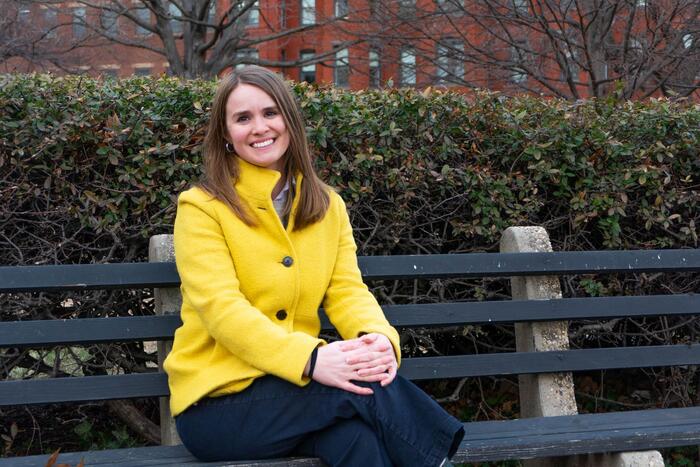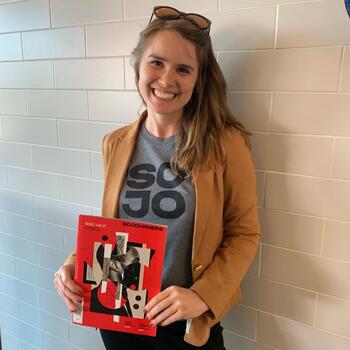By Kim Lawton
These are challenging times for journalists. According to recent Gallup polls, record numbers of Americans say they have “no trust at all” in the mass media. Betsy Shirley ’15 M.Div. is not ready to give up on her vocation. Yet Shirley, the Editor in Chief of Sojourners magazine, concedes that people working in the media should be paying close attention to the current moment.
“If what we are offering is not helping folks feel more informed, engaged, or, for my particular publication, equipped to inspire hope and action, there should be some soul-searching,” she says.
Shirley cites the Society for Professional Journalists Code of Ethics, which asserts that a key foundation of ethical journalism is to “seek truth and report it.” According to the code’s preamble, ethical journalists “believe that public enlightenment is the forerunner of justice and the foundation of democracy.”
“That matters to a lot of journalists, but I also think it matters to us as people of faith,” Shirley says. “If we seek a more just future, trying to articulate the truth, trying to give voice to pain, trying to leave room for hope, that’s deeply part of this work.”

Sojourners is an independent print and online magazine that covers faith, culture, and politics from the perspective of social justice-oriented Christianity. Its stated mission is to “inspire hope and action by articulating the biblical call to racial and social justice, life and peace, and environmental stewardship.” Initially called The Post-American, the magazine was founded in 1971 by a group of evangelical students who were wrestling with the relationship between faith and politics, particularly related to the Vietnam War. The students formed an intentional community and moved from Chicago to Washington, D.C. They eventually named the community and their publication “Sojourners,” based on the biblical metaphor of God’s people being pilgrims in this world. Today, in addition to publishing an independent magazine, the organization leads advocacy, education, and grassroots initiatives to support faith-rooted action.
As Sojourners chief editor, Shirley is responsible for the editorial direction of the print magazine, its online coverage, and multimedia projects. She was promoted to the position last August but has worked in various positions at the organization since 2015. In 2010-2011, she was an editorial assistant as part of the Sojourners Fellowship Program.
“I’ve always liked how the name Sojourners evokes ongoing movement: travelers, dusty sandals, a twisting road toward something we haven’t quite reached. There’s a sense of humility in that name, something I keep in mind even as we continue to offer sharp critiques of the church and other powers that be, boldly imagining a different future,” Shirely wrote in a recent commentary. “At the end of the day, we are not a smug coalition of Christians who always get it right; we are people following Jesus, earnestly committed to ever-deepening conversion in ourselves, our churches, and our communities. We walk on together.”
Journey toward social justice
Shirley’s own journey has taken some unexpected turns. She grew up attending evangelical megachurches in Dallas and the Milwaukee suburbs. It was a conservative faith. Women did not preach, and there were no openly LGBTQ people in the pews. “My sense of church history was that Jesus rose up into the clouds, Martin Luther nailed the theses on the door, and then there was a direct line to our church,” she says.
She was very invested in her teenage faith, but around the 10th grade, she says she started having questions. “I can’t describe exactly what happened except that there was this sense of questioning why we were put on this earth,” she recalls. “I wondered what the call of our faith is in what I would now call social justice, but I didn’t have that language then.”
Shirley attended Butler University in Indianapolis, where she studied creative writing and religion. During her senior year, she heard about the Sojourners fellowship, and after graduation, she moved to Washington, D.C., to work as a fact-checker at the magazine and live in community with seven other fellows.
There, she saw a “very different form” of Christianity. “It was something I was really hungry for,” she says.
Shortly after her year-long fellowship, Shirley moved to rural Georgia, where she continued to grapple with questions of faith and social justice while she lived at a community farm and taught English to refugees from Myanmar. Though all of it, she says her theology became more nuanced and inclusive.
After her experience at Sojourners, Shirley knew she wanted to explore religion journalism full-time as an editor or a writer. She debated whether to obtain a graduate degree from a journalism school or a divinity school. Ultimately, she selected YDS, where she attended from 2012 to 2015.
“I was a nerd. I still am,” she admits. “It was a privilege to be able to spend a couple years reading in-depth histories or theologies or ethics with folks who are equally nerded-out and excited to talk with you about it.”
She says her studies at YDS were “extremely practical” for the work she does now. “You get a little bit of church history, theology, ethics, pastoral care, ministry, as well as just a grab bag of other theological fun stuff. And that’s very much like my work as an editor where I have all manner of different topics coming at me every day,” she says.
While at YDS, she first heard about the Religion News Association, the professional association for journalists who report on religion. She is an active member and past president of the organization, as well as a current board member. In the fall of her last year at YDS, Shirley saw a job opening at Sojourners and persuaded them to let her work halftime as she finished her divinity degree. She came onboard full-time in 2015.
Inspiring hope and action
While many describe Sojourners’ ideology as “progressive” or “left leaning,” Shirley says she and her colleagues struggle over those labels. “When people ask who our audience is, I sometimes say our audience is heartbroken Christians. As people who feel deeply discouraged by the versions of Christianity that are most dominant in public life, they are longing to find people who see it differently,” she says. “The thing we hear over and over from readers is, ‘Wow, I didn’t know there were other Christians who thought this way,’ or ‘I thought I was the only one at my church who was asking these questions.’”
The second Trump administration and many of its policies, Shirley says, are posing new challenges to Sojourners’ mission. “We strive to articulate the biblical call to social justice, but also to inspire hope and action. That’s a tall order anytime but especially right now,” she concedes.
 Shirley says Sojourners strives to provide “thoughtful” content targeted to its readers. The magazine’s March cover story was an article titled, “Soul Care for Weary Activists.” Other recent pieces described Sojourner’s decision to leave the social media platform X and offered tips on how people of faith can “stay grounded during Trump’s second term.”
Shirley says Sojourners strives to provide “thoughtful” content targeted to its readers. The magazine’s March cover story was an article titled, “Soul Care for Weary Activists.” Other recent pieces described Sojourner’s decision to leave the social media platform X and offered tips on how people of faith can “stay grounded during Trump’s second term.”
“There is true grief,” she says. “I want Sojourners as a publication to be a place where we don’t have to pretend that we’re always ready to march at the front of the protest. There are people in our audience who don’t feel safe right now, whether that’s a person of color or a queer person who is thinking, ‘I don’t know if my neighbors will stand up for my rights.’’’
Inspiring hope, she believes, cannot happen without acknowledging true pain. “I don’t think a form of hope that doesn’t deal with the heartbrokenness is really hopeful at all,” she says.
During this moment, she says Sojourners is looking for stories that move beyond merely responding to current events. “Where are people of faith coming together to try to do something? When you tell those stories of small action, that also inspires people to do likewise and pushes back against what I think has been a feeling of hopelessness and despair,” she asserts.
She notes that the word “magazine” is derived from the French word “magasin,” which means a storehouse or arsenal. “There’s a lot of power in publications to provide some energy to groups of folks who feel heartbroken. There is a storehouse of ideas, of stories, of conversations that are happening and that folks are really eager to get plugged into,” she says.